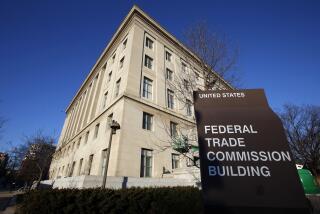Religion-Based Investment Scams Seen on the Rise
- Share via
A growing number of “false prophets” are preying on thousands of people nationwide through religion-oriented investment scams, according to a report released Monday by state securities regulators and other groups.
At least 15,000 members of religious faiths in California alone have been fleeced of $20 million to $30 million through such frauds, said G. William McDonald, director of enforcement for the California Department of Corporations, one of several state securities agencies releasing the report along with the Council of Better Business Bureaus. Nationwide, investors in at least 15 states have lost more than $450 million in the past five years, the report said.
The scams include self-proclaimed preachers and “Christian” financial planners touting lucrative returns on “divinely inspired” investments in coins, precious metals and oil and gas partnerships, the report said. Many of the scams play on people’s fears by touting dire predictions of imminent financial and social chaos.
Victims include members of all religious faiths--including the clergy--who place trust in con artists masquerading as fellow members of their churches, synagogues or other religious groups.
“People are relying on their trust in the group rather than in normal skepticism and caution in making a business deal,” McDonald said. “That is the way the con man gets his ‘in.’ ”
And because of the con artist’s identification with the religious group, everyone in the group may be involved, some even becoming part of the scam by enlisting other members to make investments, McDonald said. Members are told not to cooperate with regulators, he said.
“If you blow the confidentiality, you are told you are committing an act of disloyalty,” McDonald said.
Root’s Flight Focused Attention
“The problem here is not religion, but the expanding ranks of swindlers who are exploiting religion to fleece unsuspecting members of the flock,” said John C. Baldwin, Utah’s chief securities regulator and president of the North American Securities Administrators Assn., an organization of state regulators that co-sponsored the report.
National attention to the problem was heightened recently after the mysterious flight in July of Washington attorney Thomas L. Root, whose small plane crashed into the Atlantic near the Bahamas. Root had represented investors in Sonrise Management Inc., a Columbus, Ga., firm that raised an estimated $16 million, primarily from fundamentalist Christians, for more than 150 unsuccessful limited partnerships involved in Christian radio station licenses. Sonrise has been under investigation by North Carolina securities regulators.
Closer to home, Roy L. Comstock, a former preacher and Sunday school teacher at a large Baptist church in Los Angeles, collected $10 million from more than 600 investors in 20 states by promising risk-free, 36% returns on Treasury bill investments. Many victims were fundamentalist Christians who believed that “they were dealing with a man blessed by God with extraordinary business abilities,” the report said.
Instead, the report said, investors’ money was diverted into a phony bank in the Marshall Islands. Initial investors were paid off with money raised from new investors in a classic Ponzi scheme. Comstock is serving a four-year prison sentence for securities law violations.
The report provides several tips on how individuals can spot and avoid such frauds. They include:
- Be wary of investments that seem closely tied to a particular religious belief.
- Be cautious if the promoter of an investment opportunity tries to capitalize on connections or a leadership position within a religious group.
- Be on guard for a new member of a religious group who springs up out of nowhere with a “sure-fire” investment scheme.
- Ignore claims that religion-based investments are unregulated. Virtually all investments, including church bonds, are regulated under state or federal securities or commodities laws. Any claim to the contrary is a tip that you may be dealing with a con artist.
- Check out the promoter and the investment opportunity. Do not rely on faith that the deal will work.
Individuals wishing to report such scams may call the state Department of Corporations. In the Los Angeles area, the number is (213) 620-6566. In the San Diego area, call (619) 237-6185.
To the extent the scam involves theft, investors may also call their local district attorney’s office, McDonald said.
More to Read
Sign up for Essential California
The most important California stories and recommendations in your inbox every morning.
You may occasionally receive promotional content from the Los Angeles Times.









